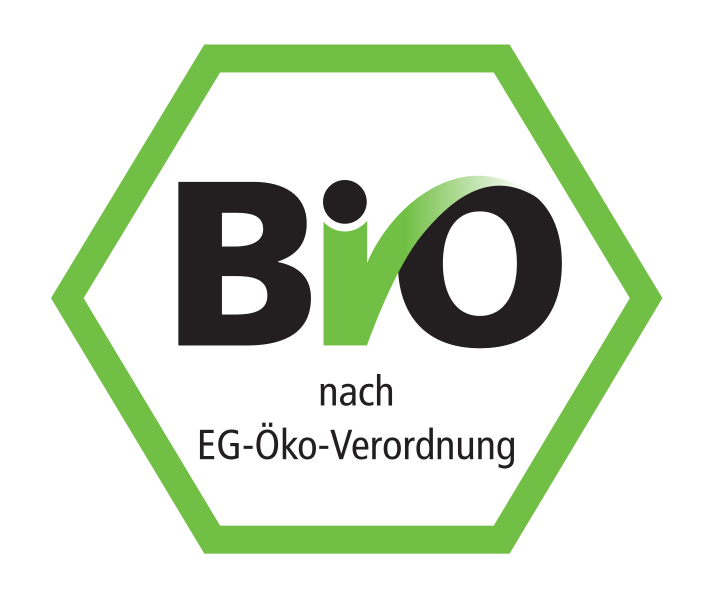CONTROLLED ORGANIC
FARMING
ORGANIC TEA & HERBS
PREMIUM QUALITY
An organic product is characterised by gentle cultivation. This means that neither pesticides may be used nor the end product can be genetically modified. This standard (EC Organic Regulation) is controlled by independent institutions already in the origin unannounced.
These controls then follow along the supply chain to the last reseller. In conventional tea cultivation, on the other hand, pesticides may be used and there are no regular checks on the product.
To ensure that these raw materials comply with the standard and can be consumed without hesitation, our in-house quality management department, in close cooperation with our purchasing department and independent testing laboratories, constantly checks and analyses these raw materials.

Organic through certification
You would like to launch an organic product on the market? No problem!
We will provide you with all the necessary things concerning the product, the markings on the packaging and the placing on the market.


In the next sections we will explain in detail what differentiates organic tea from non-organic tea. In addition, we will explain the steps we take to ensure that we meet all European organic standards with our products.
For more information about organic, the requirements for organic certification and news, please visit the official website of organic agriculture – www.oekolandbau.de.
What’s the difference between Organic and non-organic tea:?
For thousands of years people have been drinking tea, since it ws first discovered in China. In these days, all teas were ‘t organically grown as the soild was not polluted by the use of chemicals and before GMOs were discovered.
According to legend, tea was discovered by Shen Nong, a Chinese emperor and father of traditional Chinese medicine, about 5,000 years ago.
It all started with a leaf – a tea leaf – that happened to fall into his cup of hot water. Being curious about herbs by nature, he drank it. Thanks to the transparency of his skin, he could immediately see the effect of the tea on his body.
The first teas were harvested not from cultivated but from wild tea bushes. Consequently, all teas were originally organic. In fact, some ancient tea plants still grow freely in China. They still have much to offer after several hundred years and are the closest thing to organic tea that we know. However, they are never called organic tea.
Organic tea is any tea that is grown according to the principles of organic farming as defined by IFOAM in Europe or other organizations in their country of origin.
The 4 main principles of organic farming state that :
- The health of the soil, animals, plants and people must be maintained and promoted.
- must be based on living ecological systems”,
- must be fair “must protect the health and welfare of present and future generations and the environment”[1].
- The soil must be free of pesticides, herbicides and chemicals for a perido of at least three years before they can be awarded acertification. Organic products must not contain manufactured nanoparticles[2] or GMOs.
WHAT IS ORGANIC FARMING AND WHY IS IT IMPORTANT?
Organic farming has holistic origins.
“In 1939, the term ‘organic farming’ was coined from the idea of the ‘farm as an organism’ to describe a holistic, ecologically balanced approach to agriculture.
Wikipedia
With the introduction of synthetic chemicals including erosion, soil depletion, and the decline of crop species, the modern organic movement emerged in the early 20th century in response to the damage done to agriculture by the Industrial Revolution.
Organic farming focuses on the traditional farming methods that have been used to preserve and improve the soil for thousands of years before the introduction of chemicals. It was believed that improving soil conditions would provide a sustainable agricultural solution that would produce tastier and more nutritious food.
Organic farming is a certified process.
In order for a product to receive the “organic” label, a government-approved certification body must inspect the farm where the food is grown to ensure that the producer meets all the regulations and standards set by the EU Authorities.. Darüber hinaus müssen Unternehmen, die Bio-Lebensmittel behandeln oder verarbeiten, bis sie in Supermärkte oder Restaurants gelangen, zertifiziert werden. Furthermore, establishments that are handling or processing organic food before it reaches supermarkets or restaurants must be certified.
Products covered by EU organics rules
A product can’t just be labeled organic by anyone and be called good. The European Union has a government-controlled organic certification program that specifies how food must be grown and processed in order to be labeled organic.
The certification process is time-consuming and the certification standards are strict.
This process reassures consumers that when they buy a product labeled “organic,” they are buying a product that is free of toxic chemicals and that the company they are buying from supports environmentally friendly farming practices.
Organic food is free of pesticides and synthetic chemicals.
The demands of the European market are stringent with regard to food safety and quality.
Among the most important is the legislation on pesticide residue limits. Also important are hygiene aspects and harmful substances. In addition, sustainability is an increasingly important requirement for products entering the market.
Conventional certifications (e.g. Rainforest Alliance and UTZ Certified) are generally required in the mass market segment. In recent years the Fair trade certification has been progressively recognized in the high-volume and mass segments. In the premium and specialty segment, Fairtrade and organic certifications predominate.
The USDA also follows strict rules when it comes to organic certification. Here is what they thier guidelines say:
USDA
Pests and diseases are controlled with the use of synthetic pesticides on conventional farms, while feeding their crops with chemical fertilizers.
These pesticides and chemicals leave residues on and in a plant exposing the people working with the plant to these chemicals and which may be ingested with the final feed from the plant.
The European authorities, have conclude, after detailed research and testing, that an organic crop contains much less pesticide residues compared to a conventional crop. The reason for this is that organic farmers use natural fertilizers – such as manure or compost – on their plants and in the soil, and use natural pesticides and beneficial insects to limit pests and diseases.
Does organic tea taste better?
https://en.wikipedia.org/wiki/Harold_McGee
What tastes best is certainly a subjective question. But here are some theories as to why many claim that organic food tastes better:
The aroma and flavor of a plant come from the phytochemicals that the plant stores to protect itself against invaders such as microbes and insects. Organic plants that are not protected by pesticides tend to store higher amounts of these flavor-giving phytochemicals to protect themselves against their natural enemies.
Organic plants are often allowed to flower and mature at their natural pace, rather than being sped up with chemicals at harvest, giving them time to further develop their natural sugars and other chemical compounds that contribute to the final flavor of the plant.
Organic crops benefit from more nutrient-rich soils, so plants are better nourished and cared for.
Can you recognize organic tea by its taste?
Some organic teas may have less flavor than non-organic teas because different fertilizers also affect the flavor, color and fragrance.
For example, non-organically grown, shade-grown Japanese tea is often considered to have a better taste than organic tea. In fact, only less than 5% of total tea production in Japan is organic. However, this is not a general rule.
All teas are different, and it is impossible to tell which tea is organic and which is not based on taste alone. However, taste can be an indication of the quality of the tea, and whether it is organic or non-organic, it should be tasty and fresh either way.
Why is it easier to adulterate tea?
According to the organic guidelines, certain additives may be added to organic foods. This also applies to tea. Adulterants are any substances used to improve the appearance, taste or smell of the tea that should not actually be in the tea.
For example, old tea leaves can be dyed, dried and sold as a new, healthy product. Various ingredients can be added to the tea leaves to increase the weight of the tea.
The good news? Manipulating tea bags is easier than manipulating tea leaves.
Organic tea can also be adulterated, making it less healthy and of lower quality than non-organic tea. With loose tea, the adulteration is very low compared to tea dust in bags.
Both organic and non-organic tea quality is mainly related to the producer’s moral and ethical principles.
There are hundreds of different types of tea in the world, each one presenting unique properties. Some of them are more resistant to pesticides and therefore do not require as intense care as others. Small family farms are much more likely to adopt good principles, even if they do not produce organic tea.
Is natural synonymous with organic?
Many teas have the word “natural” or “all natural” on their packaging. However, this does not mean that they are organic.
If the tea is natural, it only means that no artificial ingredients were used for coloring, flavoring and seasoning. Therefore, the word “natural” does not imply biological principles.
What does Gräfenhof Tee do to ensure that our tea is from organic cultivation?
To ensure that we can deliver safe products, we research our sources and make sure that we can always trace your tea back to the farmers and/or plantation departments.
Organic labels can point you in the right direction.
They guarantee that
- At east 95% of the ingredients were organic farming sourced
- Organic and conventional produts are different and requiring different production and storage methods
- Safe from the presence of any genetically modified products, including in animal feed
- A strong restriction on the use of antibiotics in animals compliance with specific rules on animal welfare, such as the size of the pen or the number of animals per square metre.
Entre os requisitos aplicáveis à produção orgânica não há diretrizes para metais pesados, como cádmio, chumbo, arsênico ou cobre. São substâncias presentes no ar, na água e no solo e podem contaminar qualquer cultura orgânica. Na Bélgica, pesquisadores demonstraram que tanto os alimentos orgânicos quanto os não orgânicos podem ser perigosos.
CONTACT
Do you have any questions, requests or suggestions? We would be pleased to hear from you!
CONTACT :
[email protected]
+49 (0) 4167 238 930
Mo.- Th. 8:00-17:00 Hrs.
Fr. 8:00-14:00 Hrs.
ADRESS
Gräfenhof Tee GmbH
Zum Fruchthof 6
21614 Buxtehude
